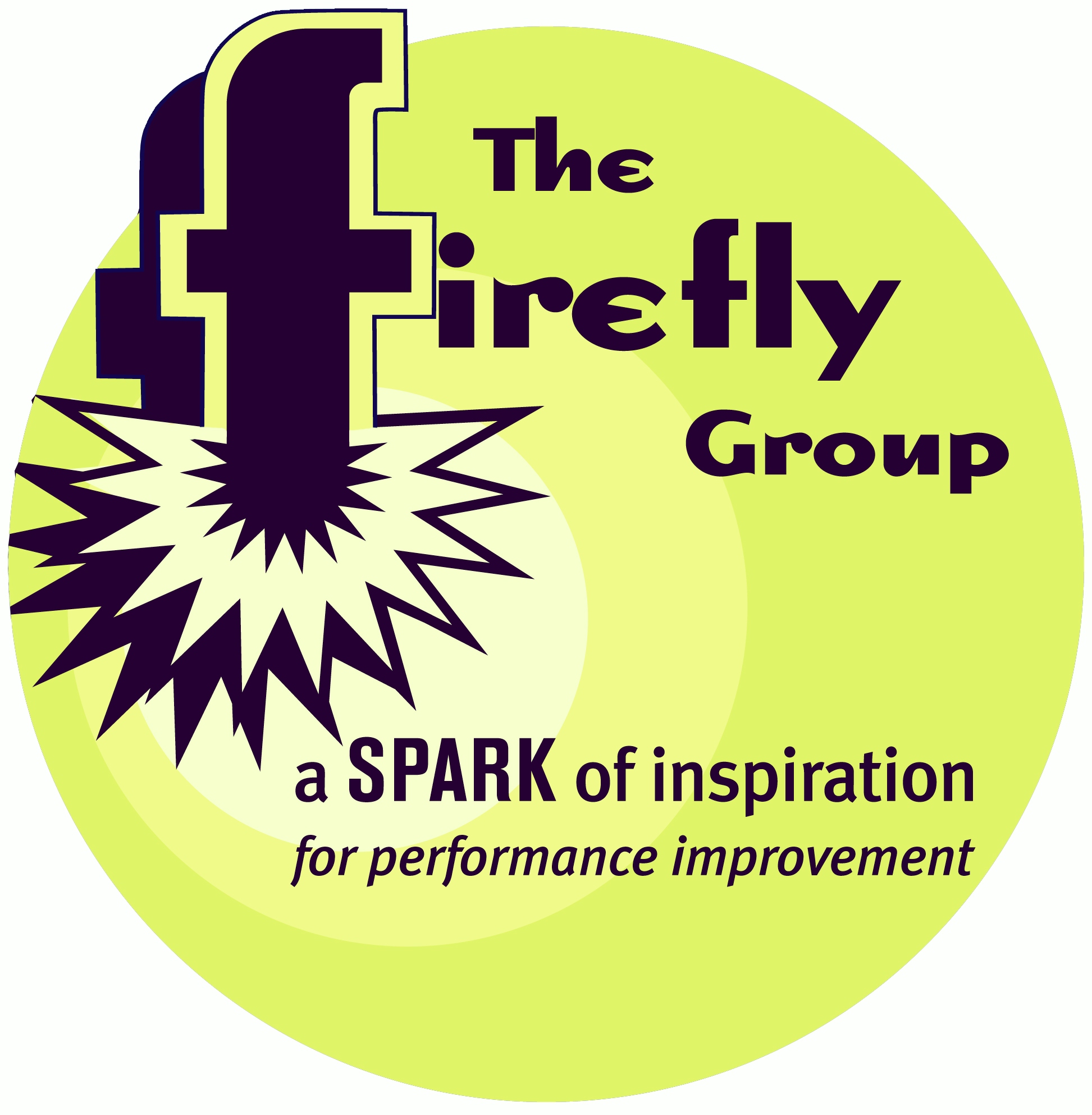

Boredom
Busters
Comes to 5 Cities
.png)
You can attend Boredom Busters at these cities in 2014:
San
Francisco
Phoenix
Atlanta
Washington D.C
Los Angeles
Click HERE for more information.
What We Do
The Firefly Group helps people use everyday situations for learning and connecting to the Big Picture. After working with Firefly, you will be energized with specific action steps to achieve your goals.
We do this through training of trainers, leadership development, performance improvement training, strategic planning, writing training manuals, and clarification of organizational mission and vision. Our methods are engaging, thought-filled, and results-oriented.
 If
this sounds like a good direction for your organization, let's talk about
how we might collaborate! Please give me a call (802.257.7247) or send an
. - Brian
If
this sounds like a good direction for your organization, let's talk about
how we might collaborate! Please give me a call (802.257.7247) or send an
. - Brian
 Your ETR (Estimated Time to Read): 5minutes Your ETII (Estimated Time to Implement Ideas): 5 weeks |
December 2013
|
Say
It Quick |
Discoveries bits of serendipity to inspire and motivate |
Ideas fuel for your own continuous learning |
Activities tips and tricks you can try today |
| What's Fair? | Discrepant Events | The Inverted Glass |
Even though we crave consistency, it's the differences and inequalities that spur us to action and new learning. This month we examine discrepant events beginning with this 99-Word Story.
What's Fair?
How's the water today? That's a common question among the morning lap swimmers at the pool. On any given day, one person will say it's too hot while another complains that it's too cold. There is no pleasing everyone!What I find most difficult, though, is not having either hot or cold water but having both. The biggest stressor is experiencing the sudden shock of going from hot to cold as you swim a lap. It's nearly impossible to become acclimated.
Whether team responsibilities, household rules, or tax laws, it's the inconsistencies that produce the most discontent.
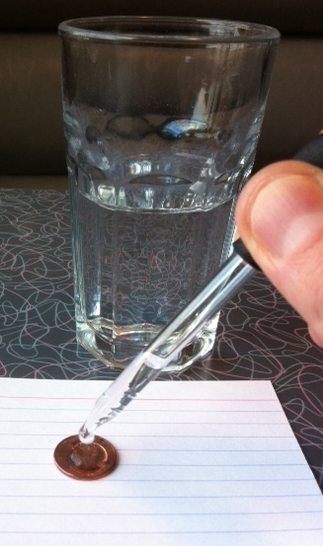 Discrepant
Events
Discrepant
Events
I was introduced to the concept of discrepant events at a recent conference
of the North American Simulation and Gaming Association (NASAGA). There, Becky
Puckett, Training and Development Manager for the White Castle Corporation,
shared her favorite activities based upon discrepant events.
Becky explained that, in science education, a discrepant event is the demonstration of an experiment that has an outcome very different than what most people would expect. Using her former experience as a science teacher, Becky has adapted these activities to teach innovative thinking, problem solving, and as a metaphor of the topic she is teaching.
Here is an example that shows the flow of using a discrepant event and what might be learned from it.
Distribute a penny, eyedropper, and a small cup of water to each person. Then ask them to predict how many drops of water a penny can hold on its surface before the water spills over onto the table. (Making predictions is important because it forces people to ponder and make a public statement about their knowledge and beliefs.) Then invite people to experiment by gently placing water droplets onto their penny. The experimenters in Becky's workshop were able to put forty to fifty drops on their pennies creating a bulbous, wobbly dome!
Ask people to
explain why so many drops of water stay on the penny. After some responses,
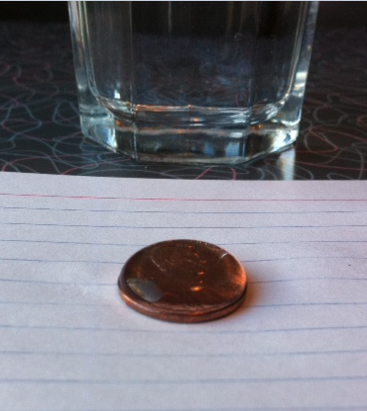 explain that the surface tension of the water causes the droplets to cling
to one another.
explain that the surface tension of the water causes the droplets to cling
to one another.
Next, turn this phenomenon into a learning activity for your next training by examining and analyzing the elements of the experiment. Here are a few observations:
With these aspects of the experiment in mind, it could be used to teach about teamwork - the water molecules must adhere and work together like the members of a well-functioning team. It could be a model for change management in that steady, patient work toward change is most effective. Or it could be an example of feedback: when it is given to others carefully and appropriately, the best qualities of those individuals become magnified.
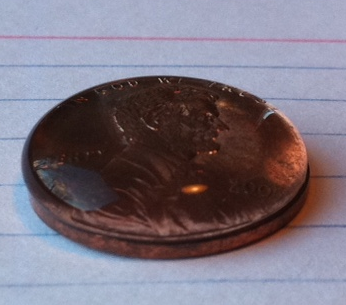 In
science classes across the country, discrepant events are used to get attention,
to sharpen skills of observation, to practice making predictions, to train
about gathering data, and to conduct experiments. You can use them to hone
the same skills in your organization. In addition, when used as a metaphor
of your training topic, you can create a memorable activity to make your training
stick.
In
science classes across the country, discrepant events are used to get attention,
to sharpen skills of observation, to practice making predictions, to train
about gathering data, and to conduct experiments. You can use them to hone
the same skills in your organization. In addition, when used as a metaphor
of your training topic, you can create a memorable activity to make your training
stick.
Where can you find more examples of discrepant events? Here are a few that Becky Puckett (You can contact Becky by email: puckettb@whitecastle.com.) shared in her NASAGA session:
Additionally, you can find many examples of discrepant events and how to use them in books like Brain-Powered Science by Thomas O'Brien (ISBN-10: 1935155105), on the web with a search of "discrepant events," or on You Tube: http://www.youtube.com/playlist?list=PL7F82281E7CF467AB
And, as the 99-Word Story suggests, you can find discrepant events in your daily activities whenever there is a mismatch between expectations and what really happens. You can turn discontent into teachable moments!
Conduct your own exploration of discrepant events. Then, when you use them in your next training, your startling results!
Learning that's
On Track
I never knew whether it was to tease us or torment us but one of my friends
in college consistently mispronounced the word "discrepancy." Instead of placing
the usual emphasis on the second syllable, he intentionally stressed the third
resulting in "dis-cre-PAN-cy." The effect was humorous and disconcerting.
It gave me a bit of a jolt; a sudden, slight bump in my smooth train of thought.
This is the value of discrepant events. We think we know what will happen in an experiment but when the outcome is a surprise, our smooth thinking abruptly jumps the track. In order to get things running again, we have to revise our previous theory or devise a new one.
Discrepant events are the key to real learning. Typically, we think that learning has happened when a person knows a lot of information. So we lecture, assign books, and search the internet. All this information produces knowledge but knowledge doesn't always result in wisdom or changed behavior. For deeper learning to occur, we need to challenge our mental models, shake up our world view, change the focal length of our personal perspective.
All learning should include discrepancies. Learners should experience some degree of cognitive dissonance. They should be challenged to resolve differences between their own world view and another. They should feel a bit uncomfortable until they resolve the inconsistencies between those dissimilar but valid perspectives. And they should be inspired to change their behavior; to do something new as a result.
Sure, the purpose of some meetings or trainings is to be certain everyone has the same information. But even then, it's important to encourage critical thinking. Challenge people to look for differences between the new information and what they already know. Invite them to resolve discrepancies and, if necessary, switch to a new track of thinking.
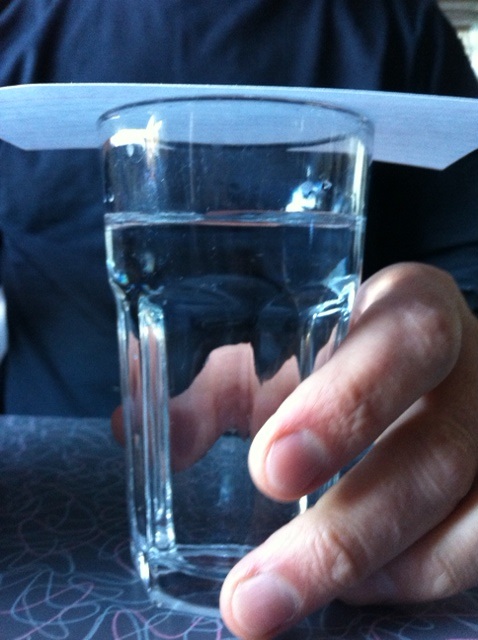
The Inverted
Glass
The purpose of discrepant events is to turn things upside down - to surprise
people with an intelligence jolt. Here is an activity to turn over your thinking
both literally and figuratively.
The Inverted Glass is a very simple discrepant event yet it has an extremely surprising effect with great potential for learning. The flow is described here with several possibilities for interpretation at the end. If you give it a try, please what happened!
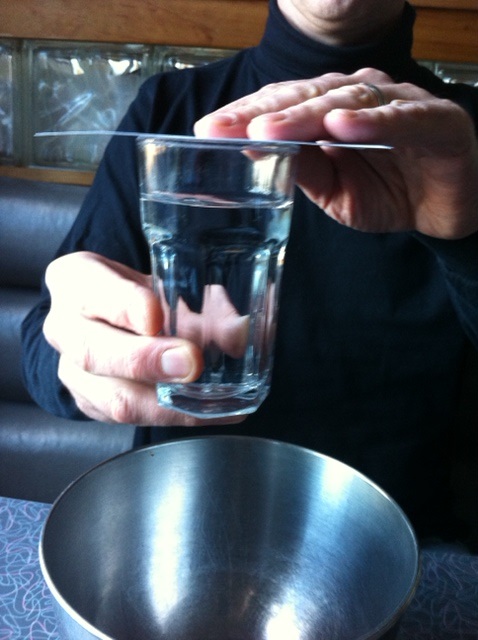
The Inverted Glass
Materials:
Glass of water
Index card large enough to cover the opening of the glass
Bowl to catch water dripsPrediction:
Cover the top of the water glass with the index card. Ask people to predict what will happen when you turn the glass over holding the card in place.Be sure the card covers the glass completely. Invert the glass over the bowl while holding the card in place. A few drops of water may drip out.
Now ask for more predictions of what will happen when you remove your hand that is holding the card in place.
Action and Effect:
After predictions have been made, remove your hand. The card will stay over the opening of the inverted glass trapping the water safely inside. Make sure the card is not too big or it will sag and let water escape.Depending upon various conditions, you may be able to turn the glass sideways, right side up, and inverted again without touching the card or losing water. (This works better when the card become a bit soggy.)
Participant Explanations:
Invite participants to explain how the water is able to stay inside the inverted glass. If possible, give them their own materials and let them experiment with varying amounts of water and different types of containers and covering materials.
Scientific Explanation:
The basic principle at work is air pressure. When the pressure inside and outside the glass is equal, the cover remains on the glass and the water stays inside. The same effect occurs when you put a drinking straw into a glass of liquid. Put your finger over the top and you can draw out a column of liquid that doesn't escape from the opening at the other end of the straw.If a very rigid card is used, you might also be able to see a thin layer of water between the lip of the glass and the card. This indicates that cohesion of the water molecules is also having an influence.
Possible Learning Points:
Consider the different elements of the experiment then connect them to a topic you are teaching about. Here are some possibilities:
- Personal Resilience to Stress: Internal and external assets (forces inside and outside the glass) work together to enable a person to "hold it together." The card represents a thin boundary between "having it" and "losing it." That thin margin and its permeability are different for each of us.
- Change: We can withstand tremendous upset when we are internally balanced and have good external support.
- Leadership: Leaders (the card) must fit their position well to hold the tension between the goals of the organization (outside pressure) and the interests of the team (internal pressure).
- Motivation: Engagement is a combination of opportunities (outside pressure) and passion (inside pressure) that keep us balanced toward our goals.
- Negativity: It doesn't matter whether you are a pessimist or an optimist (the glass half empty or half full) you still have to respond effectively to the pressures around you.
- Learning: There is an art to teaching so that people retain and use what they learn even when things get turned upside down.
|
Whether you need a keynote speaker, or help with strategic planning, performance improvement, or training facilitators and trainers in your organization, I look forward to your call (802.257.7247) or . -- Brian |
Read previous
issues. Click Library!
To add or delete your name to our mailing list, email
with a short note in the subject line.
I want this newsletter to be practical, succinct, and thoughtful. If you have suggestions about how I can meet these criteria, please let me know! Send me an with your thoughts and ideas.
Home
| Services
| Products
| Mission
| Ideas |
The Group
| The Buzz
(c)
2013 The Firefly Group